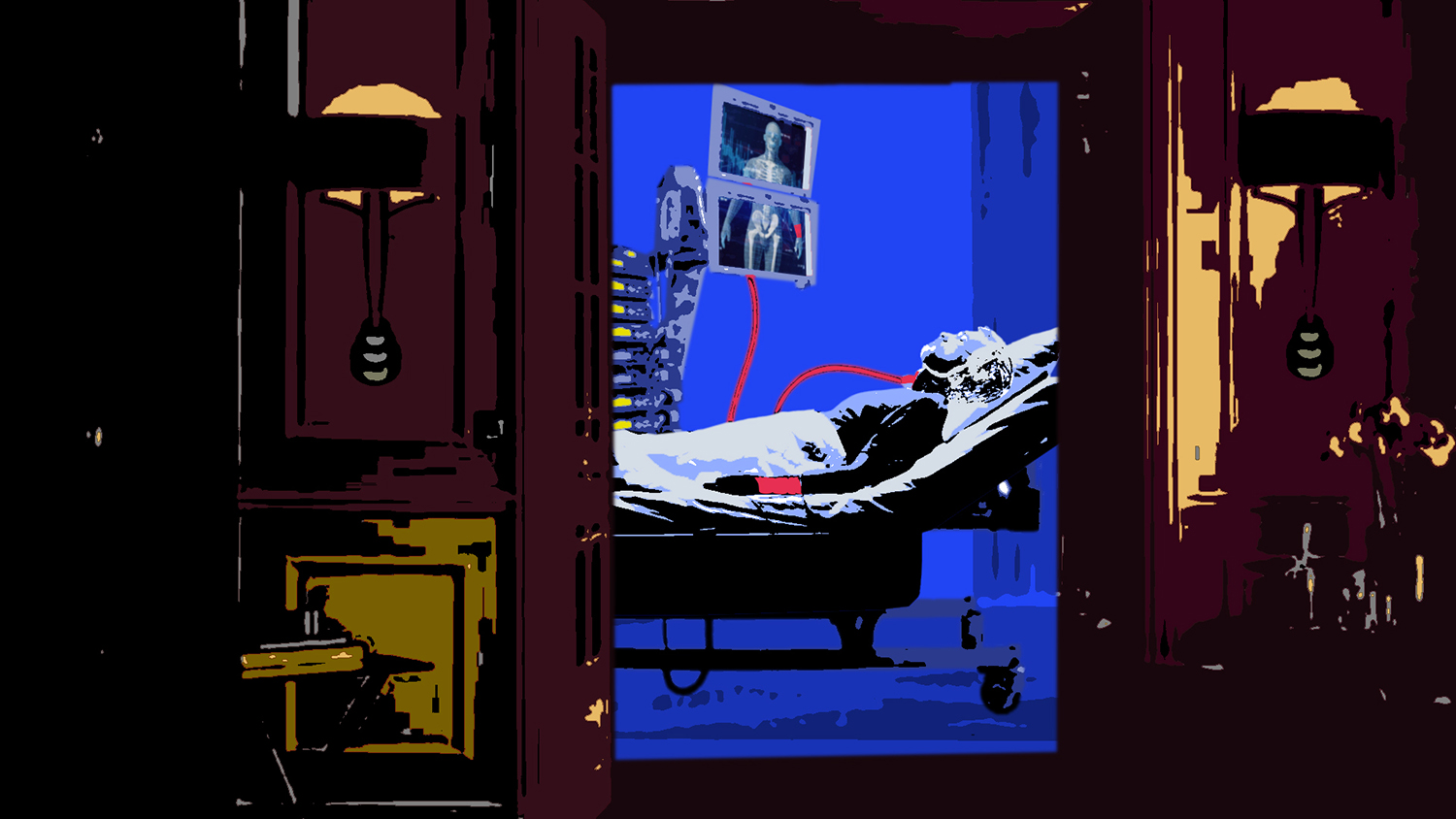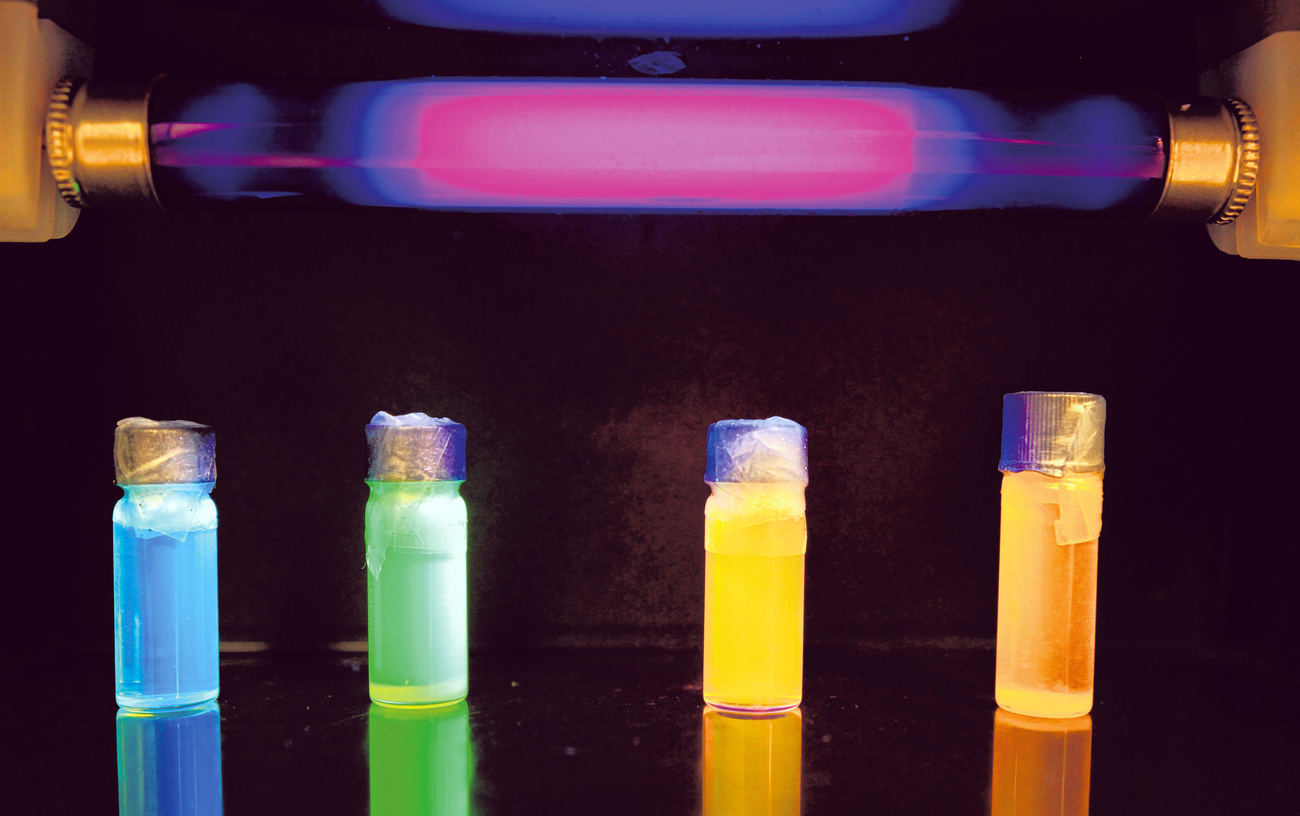
Nano Ex Machina

In the not-so-distant future, Switzerland’s booming nanotechnology industry has helped transform the country into an El Dorado for those seeking to put an end to human aging. Seeking to take advantage of the seemingly miraculous therapeutic applications of these new technologies, Elias, a wealthy German industrialist travels to Geneva to cure a rare genetic disease. But when he awakens in his hotel room after the procedure, an unknown entity has taken control of his body and mind…
www.rtsinfo.chExternal link, April 8, 2022
Since the beginning of time, men have cursed the frailty of the human form and sought the means, be it through pharmacology or, more recently, robotics, to cheat death. This irrepressible need to enhance our physical motricity, and our cerebral and social capabilities is reflected in the standards and codes constructed around the Promethean myth.
Thanks to the work of Professor Jochem Bloedhorn and his team of scientists, conceptualization and development of a new post-human form has become today’s reality.
With the eyes of the global scientific community eagerly watching, the eighty-year-old professor of biotechnical science claims his nanobiotechnological research has led to a historical breakthrough in his relentless pursuit of eliminating dysfunctionality from the human organism.
Deep within the EPFL laboratories of the Geneva Biotech Campus, Professor Bloedhorn has developed a game-changing method of engineering tiny nanochips capable of rectifying human imperfections. The work, which finally makes the professor’s dreams a reality, has been lauded by the scientific community and is widely expected to receive the Nobel Prize
Utopia or dystopia? Dream or reality? The contemporary technological revolution confronts us with fundamental questions about the future of humanity. Will new technologies be our ally or enemy? How will they change our role in society? Are we destined to evolve into a species of superhumans or to be outclassed by the power of machines?
“Tomorrow’s Utopias and Dystopias” is an original series of science fiction short stories created by SWI swissinfo.ch to try to answer these questions in an innovative and visionary way. Thanks to the creativity of a group of fiction writers and the collaboration of researchers and professionals working in Switzerland in the fields discussed in the stories, we will try to imagine and understand how technology might shape our lives. Each science fiction story will be accompanied by a factual article in collaboration with leading Swiss scientists to give an understanding of what’s happening in some of the most cutting-edge research fields and spark your imagination!
But one question remains: given the stakes at hand, are we not taking the road condemned by Günther Anders in his work “The Obsolescence of Man”? That is, will our technological advances come to the detriment to humans ourselves?
Indeed, various are the detractors of Professor Bloedhorn’s achievements. Among them, the fringe group ‘Fabrica’, named in homage to André Vésale, the Renaissance anatomist whose work was the origin of what we now call ‘transhumanism’. These Anonymous activists are determined their fight will only end when…
Like to know more? Hit subscribe to read on…
[…]
Flashes of light… Screeching brakes, horns blaring… Sounds enhanced… No pain…
I open my eyes. Close them again. Dazzled by the sun streaming through the windows of the room in which I lie face down on the floor.
With surprising ease, I drag myself from the carpet. I have the impression that my body is not mine. Amazed by my agility, muscles tense, I scan the room, eyes alert. I recognize nothing.
A luxury suite, bed unmade, table and chairs overturned.
I try to remember. In vain. I don’t understand what has happened here, nor what I’m doing here. My memory clouded by a tangle of questions.
Brow furrowed; I register a scattered mess of papers scrunched into balls. At random, I seize one, unravel it mechanically. One phrase, scrawled across the page.
I unfold another piece, which provides more information. The texts are incomprehensible, but… placed end to end, they form a message.
With almost automatic, surgical precision, I piece the puzzle together, aligning the papers, putting them back in order, and, once satisfied with the arrangement, read the message aloud. It speaks of me (or to me?).
Your name: Elias Aeschbach
A German citizen, your father, Reinhardt, made his fortune in the metal industry

In Geneva for treatment of Osler-Weber-Rendu genetic disease using the nanotechnology developed by Prof. Bloedhorn
Injection of 7 nanochips, 1 for each vital organ. They fix your body’s problems, repair the bleeding
All OK
You return to the Hotel Bergues, at the garage exit, obscured
4 faces, Anonymous, jump you, drag you to a cellar, link you to a machine
Fabrica, activists who use technology to demonstrate the danger of its misuse
They reprogram the nanochip

Take you back to the hotel
In this room, you write these words before falling into the background of yourself
Before you are controlled
Don’t listen to the voice
E.A, September 1, 2023, Geneva
The message perplexes me. I call the concierge who confirms I am Elias Aeschbach. I rented Suite 417 four days ago. Last night, friends brought me home in a ‘tipsy’ state. He apologizes. I hang up.
His words are meaningless, the only thing that resonates within me, like a warning, is the phrase “don’t listen to the voice”.
I search my memory. Draw a blank.
Is this message really from me?
- Yes, answers someone.
Stunned, my eyes sweep the room. No-one there.
- Who spoke?
- The voice.
My heart is racing. The voice is in my head.
- You… you don’t exist.
- I do.
- What have you done to me? And who… what do you want?
A lump forms in the pit of my stomach before instantly disappearing.
- Have no fear Elias, we have just desensitised your tonsil, the source of your fear. You still have some after-effects of your old reactions, but we are regulating them.
- Did you make it disappear?
- Yes.
Something unknown comes alive within me. I feel no fear, but the sensation of emotions being wrung from me is peculiar. The voice speaks again:
- Your emotions create levels of stress and lead to inappropriate behaviour. We’ve modified that, fixed the weaknesses of your organism, improved some functions like hearing and vision, stimulated your vital and muscular functions. Once you have adjusted to your new capacities, you’ll be more than a human.
- Feeling is essential, it is what gives us life. I don’t allow anyone to control me… what options do I have?
- None. Obliterating the disfunctions with which you were born, that is the choice that you made.
- Science enabled me to heal an illness, I didn’t choose to speak to a… to something that can read my thoughts.
- You, humans, have always been slaves to your desire for perfection. We are simply the reflection of these desires.
- This is slavery! What do you want?
Prolonged silence.
- There is already a multitude of us. The future is communitarianism. The future is the Swarm. Soon, we will control all the economic, judicial, political, and medical infrastructures in your world. Suppressing your emotions will soften your view of ‘living together’ and fill the gaps in your tolerance, because all that matters is your wellbeing.
I laugh cynically.
- And Fabrica’s role in all of this?
- Useful, but insignificant tools in our development. By concocting a dominant technology to turn against its creators, these Anonymous made us into an autonomous system.
Elias Aeschbach/the instrument leaves the Four Seasons. The weather is fine. The sun floods his face. A new dawn awakens. People come and go. They have no idea the extent to which they are prisoners of themselves.
The voice/the control: The Swarm swarms.
Elias Aeschbach/the instrument: is this the future? We become the puppets of our toys?
The voice/the control: silence.
* * *
Thanks to his atypical path, which led him from architecture to archaeology and finally to real estate management and appraisals, Kurt Fidlers is an eclectic author. His narrative universe draws on the codes of thriller, fantasy, science fiction and even the burlesque.
How realistic is the story you just read? An expert from the Swiss nanoscience institute SNI at the University of Basel explains why nanoparticles will never take over the human mind, yet they will be essential for healing diseases such as cancer.

More
‘Nanotechnology is the medicine of the future’

In compliance with the JTI standards
More: SWI swissinfo.ch certified by the Journalism Trust Initiative































You can find an overview of ongoing debates with our journalists here . Please join us!
If you want to start a conversation about a topic raised in this article or want to report factual errors, email us at english@swissinfo.ch.